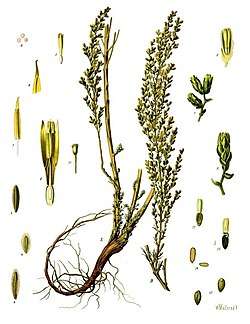シナ
See also: しな
Japanese
Etymology 1
From Middle Chinese 支那 (tsye na), a phonetic transcription of Sanskrit चीन (cīna), itself likely deriving from Old Chinese 秦 (*dzin), the name of the Qin Dynasty and the Qin state.
Alternative forms
Proper noun
Usage notes
The kanji spelling 支那 was more common historically, and is still encountered with some frequency when this word is used. However, this term as a whole is used less frequently than in the past, due in part to changes in geopolitics.
Derived terms
Etymology 2

シナ
From Latin cina, variously given as short for Artemisia cina ("Chinese artemisia"), or Semen cina ("Chinese seed")[1]. The kanji used are ateji.
Alternative forms
- 支奈
Noun
シナ (hiragana しな, rōmaji shina)
- Artemisia cina: also known as santonica, Levant wormseed, and wormseed; an herbaceous perennial of the daisy family, historically used as a vermifugic anthelmintic (a drug to rid the body of parasitic worms)
Synonyms
- シナヨモギ (shina yomogi)
- セメンシナ (semen shina)
This article is issued from
Wiktionary.
The text is licensed under Creative
Commons - Attribution - Sharealike.
Additional terms may apply for the media files.